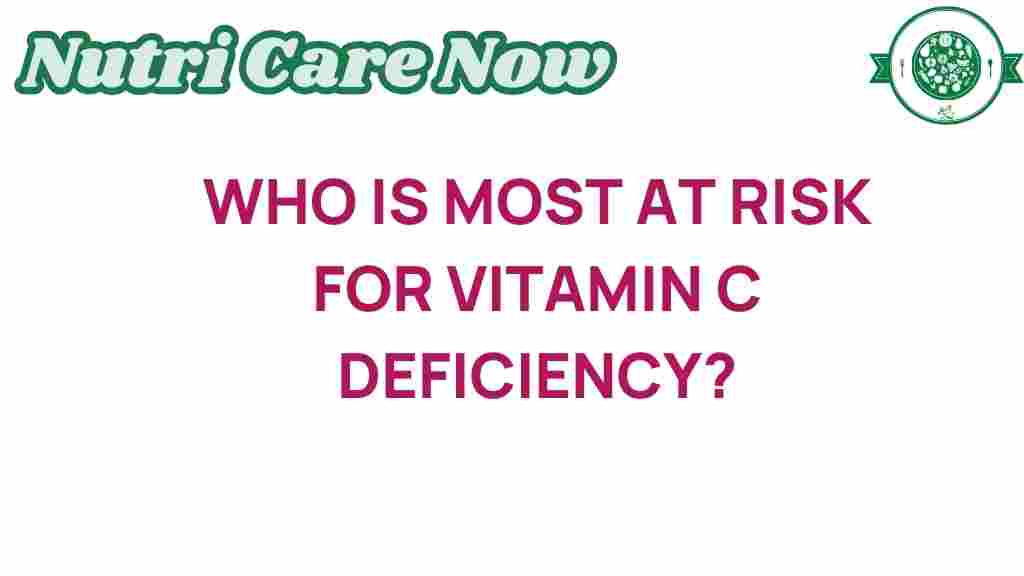Unveiling the Hidden Risks of Vitamin C Deficiency
Vitamin C, also known as ascorbic acid, is a vital nutrient that plays a crucial role in maintaining overall health. Despite its availability in various foods, vitamin C deficiency remains a concern for many individuals, leading to a range of health risks. This article will explore the implications of vitamin C deficiency, how it affects the immune system, the importance of proper nutrition, and strategies for prevention, particularly for vulnerable populations.
Understanding Vitamin C and Its Importance
Vitamin C is a water-soluble vitamin that acts as a powerful antioxidant, helping to protect cells from damage caused by free radicals. It is essential for:
- Collagen synthesis, which is crucial for skin, cartilage, tendons, ligaments, and blood vessels.
- Enhancing the absorption of iron from plant-based foods.
- Boosting the immune system to fight off infections.
- Promoting overall wellness and reducing inflammation.
What is Vitamin C Deficiency?
Vitamin C deficiency occurs when a person doesn’t get enough of this essential nutrient through their diet. This can lead to a variety of health issues, the most severe being scurvy, which can cause symptoms such as:
- Fatigue and weakness
- Swollen and bleeding gums
- Joint pain
- Skin issues like bruising and slow healing of wounds
Health Risks Associated with Vitamin C Deficiency
The health risks of vitamin C deficiency extend beyond scurvy. Here are some of the significant health impacts:
- Weakened Immune System: A lack of vitamin C can compromise your immune response, making you more susceptible to infections.
- Increased Risk of Chronic Diseases: Low levels of vitamin C have been linked to an increased risk of chronic diseases, including cardiovascular disease and certain cancers.
- Poor Skin Health: Vitamin C is crucial for collagen formation. Deficiency can lead to skin issues, including dryness and premature aging.
- Iron Deficiency Anemia: Vitamin C enhances iron absorption. Without it, individuals may develop anemia.
Vulnerable Populations at Risk
Certain groups are more susceptible to vitamin C deficiency, including:
- Individuals with Limited Access to Fresh Produce: Those living in food deserts may not have access to vitamin C-rich foods.
- People with Malabsorption Disorders: Conditions like Crohn’s disease or celiac disease can impede nutrient absorption.
- Smokers: Smoking depletes vitamin C levels in the body, leading to an increased requirement.
- The Elderly: Older adults may have decreased dietary intake and absorption, making them more vulnerable.
Dietary Sources of Vitamin C
To prevent deficiency, it’s essential to include a variety of vitamin C-rich foods in your diet. Some excellent sources include:
- Citrus fruits (oranges, lemons, grapefruits)
- Berries (strawberries, blueberries, raspberries)
- Kiwi
- Bell peppers (especially red and yellow)
- Broccoli and Brussels sprouts
- Tomatoes
Step-by-Step Process for Increasing Vitamin C Intake
Here’s how you can ensure you are getting enough vitamin C in your diet:
- Incorporate Fruits and Vegetables: Aim to fill half your plate with fruits and vegetables at every meal. Keep a bowl of citrus fruits on your kitchen counter for easy access.
- Choose Fresh Over Processed: Fresh fruits and vegetables contain higher levels of vitamin C compared to canned or processed options.
- Consider Supplements: If you struggle to meet your vitamin C needs through diet alone, consult with a healthcare provider about taking a vitamin C supplement.
- Plan Your Meals: Create a weekly meal plan that includes a variety of vitamin C-rich foods to ensure you meet your nutritional needs.
Prevention and Wellness Strategies
Preventing vitamin C deficiency is essential for maintaining overall health and wellness. Here are some strategies:
- Regular Health Check-ups: Keep track of your nutritional status through regular check-ups with your healthcare provider.
- Educate Yourself: Learn about nutrition and the role of vitamins in your diet. This knowledge can help you make informed food choices.
- Healthy Cooking Methods: Avoid overcooking vegetables, as vitamin C is sensitive to heat. Steaming or eating raw vegetables preserves their nutrient content.
- Read Labels: When buying processed foods, check for added vitamin C and aim for options with higher nutrient density.
Troubleshooting Common Issues
Sometimes, despite our best efforts, we may still face challenges in maintaining adequate vitamin C levels. Here are some common issues and their solutions:
- Issue: Difficulty accessing fresh produce.
Solution: Consider joining a local community garden or a produce co-op that offers fresh fruits and vegetables. - Issue: Unawareness of vitamin C-rich foods.
Solution: Keep a list of vitamin C-rich foods handy and refer to it when shopping or planning meals. - Issue: Poor absorption due to gastrointestinal issues.
Solution: Consult a healthcare provider for potential dietary modifications or supplements that can help.
Conclusion
Vitamin C is essential for maintaining health and preventing various health risks associated with its deficiency. By understanding the importance of this nutrient, recognizing vulnerable populations, and implementing effective dietary strategies, individuals can safeguard their wellness and enhance their immune system. Prioritizing nutrition is key to preventing vitamin C deficiency and its associated complications. For more information on nutrition and wellness, check out this resource that provides further insights into maintaining a balanced diet.
Remember, a proactive approach to nutrition can significantly impact your overall health, so don’t overlook the power of vitamin C in your diet!
This article is in the category Health and created by NutriCareNow Team
